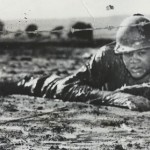
Bill Seals’ way
in the world
Story by Leigh Pritchett
Photos by Mike Callahan
For almost half a century, Bill Seals has sold bag upon bag of parched or boiled peanuts.
This is why he is affectionately known about town as “Peanut Bill.”
Sometimes, he could be seen walking – basket of peanuts in hand — to the businesses in town. Sometimes, he was a pedaling peddler, riding his three-wheeled cycle along the city streets. Sometimes, he set up his stand at a grocery store.
To many, he has become a symbol of this city and of what is right and good.
“He’s just part of Pell City,” observed Tina Ailor, manager of Food Outlet, where he sometimes sells his signature goods.
Seals started selling peanuts when he was 17. And with a laugh, he said he did not plan for it to be long term.
Now, Seals — who will be 66 in March — never intends to retire from it.
“I like it too much,” he said.
Selling peanuts, he explained, has allowed him to meet many people and establish strong friendships.
“I’ve got real good friends in Pell City,” Seals said. “I love selling peanuts, and I love my friends.”
Just moments after birth, Seals suffered two strokes that left him with physical challenges. Yet, he decided as a young boy that he would not allow this to hold him back. Instead, Seals resolved, “I’m going to go forward, if it kills me.”
He spent his formative years in Chicago, Ill., and in Leeds, where his dad was a saw-miller. He credits his father, the late Clyde Seals, for instilling a strong work ethic.
“He put the want-to (in me),” Seals said.
“I’ve always wanted to work,” Seals continued. “The Bible says, ‘Work.’ It never hurt me!”
As a boy, Seals looked to adulthood with the aspiration of owning a car and a home and having food to eat. He was determined to meet those goals.
“When I was a boy, the man of the house was the provider,” responsible for his home and family, Seals said.
As a teenager, Seals cleaned chicken houses in Leeds. At one point, he was to be laid off for two months. For that reason, he came to Pell City to stay with his grandmother, Ruby Wright, who is now deceased.
Wright encouraged him to sell peanuts and even helped him to get started with the endeavor.
Geneva Bannister of Pell City, Wright’s daughter and Seals’ aunt, recalled that her mother parched peanuts in her oven and put them in “penny candy bags” purchased from A&P food store, where Food Outlet is now.
Wright placed the bags in a market basket, which Seals took to town. He sold the peanuts and has been “Peanut Bill” ever since, said Bannister.
“I would walk to town, walk all over town and walk back home,” Seals said, noting that his grandmother lived on Florida Road.
It would take about half a day to do this.
In those days, Seals’ peanuts sold for a dime a bag or three bags for a quarter.
What Seals discovered in those two months was that he was earning more selling peanuts than he did cleaning chicken houses.
So he continued.
About four years later, he got a three-wheeled cycle. His daily travels took him as far as Sutherlin Chevrolet (where Jack’s restaurant is now) on one end of town to a hamburger place beside Henderson’s Builders Supply at another end.
Prior to Seals, there had actually been another peanut peddler in town. Upon that man’s retirement, Seals purchased a peanut parcher from him.
Later, local businessmen bought Seals another parcher. That one served Seals until it was no longer usable. Thus, Seals returned to the first parcher.
“It runs on propane and me,” he said with a laugh.
Indeed, a significant amount of Seals’ energy and perseverance is required to complete the parching process. Once the peanuts are loaded into a drum that fits inside the parcher, Seals must spend an hour continually turning the handle that rotates the drum in order to keep the peanuts from burning.
In addition to parching peanuts, Seals prepares the boiled peanuts he sells. “I do the whole deal.”
The current price for a bag of peanuts is $1.50, while boiled peanuts are $2.50.
As Peanut Bill, he would work from 9 a.m. to 5 p.m., every day except Sunday. Those hours did not include the time required to parch, boil and bag the peanuts. Even in the sweltering heat of July and August, he was diligently at work.
Seals believes selling peanuts kept him active through the years.
“If I hadn’t been peddling peanuts and going and doing, I’d be dead,” he said. “If you don’t get busy doing something, you won’t make it.”
Though preparing and selling peanuts did require a lot of time, there was still room in his schedule for walking two miles every other day, lifting weights, fishing, watching wrestling or just going for a leisurely ride in the car.
For about seven years, Seals was a familiar face at Food World, where he sold his peanuts out front.
Shortly before the Food World location closed permanently, Seals approached Ailor about setting up a stand at Food Outlet.
“We just hit it off right then,” Ailor said gleefully.
Wherever Seals is, it is not uncommon to find him talking to or joking with those he encounters. Even people who have chosen to be unkind to him found that Seals responded in goodness.
“Billy is friends with everybody in Pell City,” Bannister said. “He always smiles. He never meets a stranger, and he loves everybody. I mean that from the bottom of my heart: He loves everybody.”
Others feel the same about him, it seems.
“There’s not words to tell you how much I love Billy,” Bannister said. “I would do anything in this world in my power for him.”
Ailor called Seals “the apple of everybody’s eye. He makes our day brighter.” When he is not at the store, people ask about him, Ailor continued. “Everybody misses him.”
To see just how much Seals is missed when he is not at Food Outlet, one needs to look no further than the store’s entrance: An empty chair sits at “his place,” expectantly awaiting his return.
By being the individual that he is, Seals’ character and personality seem to be an inspiration to others.
One bit of evidence is the fact that the Greater Pell City Chamber of Commerce named him “Citizen of the Year” in 1985. More proof would be excerpts from a note that holds a place of prominence on Seals’ refrigerator:
Dec. 20, 2013
Dear Bill,
For many, many years I have admired you and all that you have done to brighten the lives of others. I am proud and thankful to have you as a friend. … Thanks for being you.
Merry Christmas from your greatest admirer!
Bill
The note’s author — former Pell City Mayor Bill Hereford — simply put into writing what others are thinking.
“He’s a wonderful guy,” Ailor said about Seals. “He’s got a good soul. He helps everybody he can. He’s just a sweetheart.”
Hereford said every conversation with Seals is uplifting.
“If he’s down, he won’t let you know it,” observed Hereford. “You just don’t find people like Bill. (He’s) just a special guy.”
Seals’ cousin, Alice Kennedy of Pell City, agrees completely.
“He’s my hero,” said Kennedy. “And I think he is a hero to a lot of people in Pell City. I think he should be an inspiration to a lot of people. I just think the whole world needs to know him.”
Discover photographer Mike Callahan has witnessed the magnitude of admiration for Seals. Late in 2013, Callahan posted on his Facebook page Mike Callahan Photography an image he had taken of Seals.
That photo has become, beyond comparison, the most popular of all the images Callahan has posted. The previous record for an image on Callahan’s page was around 500 viewings. But the one of Seals was viewed 7,028 times in a month and received 42 comments.
“I promised myself, I would never get emotional about any assignment,” said the visibly moved Callahan. But I’ve “got to tell you, this one touched me deeply. This is one special human being, to say the least.”
While the story of Bill Seals is one of determination and compassion, it is also a love story.
It began one day while he was swimming at the lake. There, he met Karen Garrett of Birmingham, a woman with physical challenges of her own. The two married and bought a house.
“He thought she was grand,” Bannister said.
For more than 20 years, they were kindred spirits. When she could not care for herself completely anymore, he did.
During the day, Seals sold peanuts, then went home to do for his wife what she could not do for herself, Kennedy said.
“He was very committed to her,” remarked Kennedy.
For two years, Seals was his wife’s steadfast caregiver. “He took good care of her,” said Bannister.
All those years ago, Seals had made a commitment to his wife. It was a vow he took very seriously, one that he was determined to uphold, no matter what.
“When you say, ‘I do till death do us part,’ you’ve got to stay with it,” Seals said.
Ultimately, though, the time came when he no longer could give the level of care she needed, even with the assistance of home health. She had to go into a long-term care facility.
During his visits, she would ask him to take her home. “It was hard because I knew I couldn’t do it,” Seals said, sadness crossing his face.
Six years ago, when the couple had been married 27 years, she passed away. Yet, the memory of their union is ever present around him — in the home decor that conveys the soft touches of a woman and the photographs that chronicle their life together.
And two wedding bands — hers and his — grace the chain that encircles his neck.















